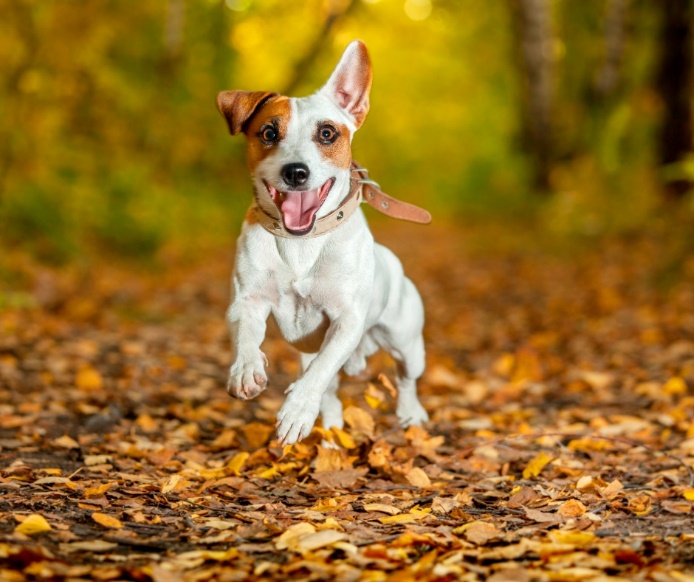Fall can be a fun time for pets. They enjoy the fresh, cool air and the fun of running through leaves. However, there are a few things that pet parents should know to keep their animals safe as the seasons change.
Thank you to the Huntsville Animal Hospital for providing us with this information!

459 Hwy 60, Huntsville
(705) 789-5181
Be Cautious of Rodenticides and Cold Weather Poisons
The use of rat and mouse poisons increases in the fall as rodents move indoors. Rodenticides are highly toxic to pets and, if ingested, the results could be fatal. Pet safe rodenticides should be used whenever possible such as those that are cellulose based. If you are planning on using rodenticides, make sure they are placed in areas not accessible to your companion animals.
Many people choose fall as the time to change their car’s engine coolant. Ethylene glycol-based coolants are highly toxic, so spills should be cleaned up immediately. Consider switching to propylene glycol-based coolants—though they aren’t completely nontoxic, they are much less toxic than other engine coolants. Refrain from putting antifreeze in water lines such as toilets, sinks, and bathtubs. This sweet liquid is very appealing to pets and is toxic even in small quantities. Instead, fully drain water lines wherever possible.

Mushrooms
These potentially toxic fungi make a comeback with the damp fall weather. Inspect areas where your pet will be, dig up any offending species and avoid stepping on them as this will spread the spores. Monitor your pet for any signs of toxin ingestion, such vomiting, diarrhea, or ataxia (off balance). If your pet eats a wild mushroom, contact your vet or animal poison control immediately.

Ticks
Beware of ticks. It’s tick season in many areas so consider using a tick repellent to help protect your pet and be vigilant when grooming.
Watch Out for Wildlife
Autumn is the season when snakes are preparing for hibernation, increasing the possibility of bites. Pet parents should know what kinds of venomous snakes may be lurking in their environment—and where those snakes are most likely to be found—so pets can be kept out of those areas.
School Supplies
Families/children will be stocking up on school supplies including pens, pencils, erasers, glue sticks etc. These supplies may be low toxicity to your pet; however, they have the potential to cause gastrointestinal blockage or upset! Ensure all school supplies are kept out of paws reach!
Thanksgiving:
There is lots of baking, visitors, and food available just in reach of our curious pets. Make sure to inform visitors of the house rules: No feeding the dog under the table and keep plates up off lower tables.
Common sources of emergencies associated with Thanksgiving include:
- Foreign Body Surgeries (remove things like corn cobs, bones, and skewers)
- Decontamination and Management of Toxin Exposures (yeast/dough, onions, garlic, and raisins)
- Pancreatitis (illness that can arise when pets eat too many rich foods, monitor your pet for any nausea, vomiting, diarrhea, lethargy, abdominal pain, or decrease in appetite)
- Be careful with decorations. Many shiny look like really fun toys to your pets. Make sure decorations are displayed far away from your pets as many of them contain toxic metals and can become choking hazards.
Halloween:
- Treats containing chocolate, raisins, and xylitol are toxic to our pets.
- Sticks, ribbons, and wrappers pose a risk of foreign bodies, so all treats should be secured out of reach.
- Not all pets appreciate wearing adorable costumes, even if designed for pets they should not be left on unsupervised.
*** Keep all cats indoors on the days leading up to Halloween!
It’s starting to get darker sooner! Make sure your pets are clearly visible to traffic and passersby. Any dogs accompanying the family trick-or-treating should wear an identification tag, and reflective collars/leashes. Designate one person who is responsible for the pet at all times, so they are not ignored during times of excitement!

Additional Sources:
Ontario SPCA and Humane Society
ASPCA



